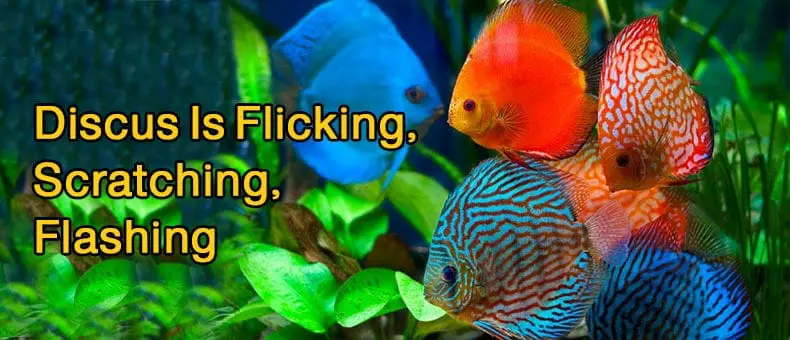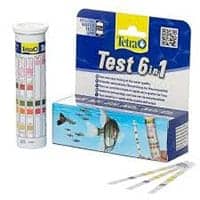
Discus flicking, Discus flashing, and Discus scratching can be caused by parasites cleaving to the body of the Discus, or ailments resulting from ammonia build up in the tank, poor water quality, irregular water temperature, the pH level of tank water being too high or too low.
Each of these reasons can be found out and treated when you constantly pay close attention to the condition of your Discus.
Table of Contents
- Why My Discus Is Flicking, Scratching, Flashing, Rubbing Against Plants?
- Discus Is Flicking, Scratching Details And Causes
- Discus Is Flicking And Scratching Treatment Steps
- Discus Flicking & Scratching Future Prevention Tips
- Related Questions
- Conclusion
Why My Discus Is Flicking, Scratching, Flashing, Rubbing Against Plants?
Discus could be flicking, scratching, flashing or rubbing its body against plants, due to several reasons:
- Discus Suffering From An Ectoparasitic Infection.
- Discus Gill Flukes Or Skin Flukes Infection.
- Result Of High Ammonia Levels.
- Discus Leech (Piscicola geometra) Infection.
- Discus Stress.
- Sometimes behaving like Twirling.
[1] Discus Suffering From An Ectoparasitic Infection
The Discus could be suffering from an ectoparasitic infestation such as ich (ick). When the fish has an ailment resulting from infestation of the body by ick, it suffers from skin irritation, soreness which will make the fish begin to flash, flick, or scratch itself against any surface or object in the tank in an attempt to make itself more comfortable.
[2] Discus Gill Flukes Or Skin Flukes Infection
Discus gill flukes or skin flukes are another kind of ectoparasites that can cause itches in the body of the Discus and make the fish begin to scratch and flick. Gill or skin flukes are parasites that you will mostly find in a dirty tank. Even if the water in the tank is changed frequently, if the fish slime that sticks at the sides of the tank is not cleaned off before the water change, these flukes can lay eggs on the slime, which will ultimately attach themselves to your Discus with time.
[3] Result Of High Ammonia Levels
Discus flashing, Discus flicking, and Discus scratching could also be as a result of ammonia levels of the water in the tank being a too high, high or low level of pH or residues of chlorine in the water which could be because of poor or no water conditioning. Though ammonia toxicity is subject to the level of water pH, and various fishes have varying pH levels that they can adapt to.
[4] Discus Leech (Piscicola Geometra) Infection
Discus leech (Piscicola geometra) attach themselves to the body of the Discus, and they suck on the blood of the fish. They are not so small as to not be seen by the naked eyes (in fact, they are 30mm or 1.2 inches long).
[5] Discus Stress
You will know that your Discus is stressed when they are swimming up and down the sides of the tank in a frantic motion. Discus becomes stressed for the following reasons:
- They are not comfortable with the size of the tank.
- The tank is overcrowded.
- They are being overfed.
- Discus don’t relate with their tank mates, and there are constant nipping and fighting in the tank.
- Poor quality of the tank water, high ammonia and pH, irregular temperature, and high nitrite level.
- Poor feeding.
Discus Is Flicking, Scratching Details And Causes
There are 4 causes for Discus scratching or flicking which are:
[1] – Discus gill flukes or skin fluke
Are parasites that look like worms and are about 1 or 2 mm in length because of this, they cannot be seen with the naked eyes (to see them, you will need a microscope). They live and lay eggs in the gills of fishes.
Furthermore, the fish is unable to breathe properly because the capacity to absorb oxygen has been hampered, and the fish eventually dies due to a lack of oxygen or bacterial infection after a while of flicking swimming in the tank.
[2] – Ammonia build-up
This could result from decomposed or rotten food that was not eaten by the fish, or it could arise from excreta in the tank.
Ammonia build-up can cause Discus to be swimming on the water surface, breathing rapidly, and the Discus body surface could turn black, sometimes it leads the Discus fish to flash swimming in the tank.
[3] – Discus Fish leech (Piscicola geometra)
These parasites are not as tiny or microscopic as Discus gill flukes. They cling to the body of Discus and suck on its blood as they depend on the nutritious value of fish-blood to survive.
Discus begins to show signs of weakness, loss of appetite, they stay at the bottom of the tank, and the body becomes milky in color as secretion of mucus rises.
[4] – Discus Fish Ich
These are similar to fleas in mammals. They attach themselves to the body of the fish and make the skin of the fish to irritate.
Discus Is Flicking And Scratching Treatment Steps
[1] Discus Suffering From An Ectoparasitic Infection – Treatment
[STEP1] – Bath discus with salt.
[STEP2] – Change 100% of the water.
[STEP3] – Clean the sides of the tank or aquarium before filling it with water again.
[STEP4] – Treat with anti parasites medicine.
Anti parasites medicine such as:
- Tetra ContraSpot.
- Malachite Green.
- Formalin.
Or formaldehyde combined with dyes such as Quick Cure and Rid Ick (dosage is One cc or ml to 10 gallons of water).
[2] Discus Gill Flukes Or Skin Flukes Infection – Treatment
[STEP1] – Bath your Discus mildly with salt.
[STEP2] – Treat with anti parasites.
Anti parasites such as Tetra ContraSpot.

[STEP3] – Treat with PraziPro.

[3] Result Of High Ammonia Levels – Treatment
[STEP1] – Download the Tetra app on your smartphone
Use the Tetra app and combine it with Tetra’s 6in1 test strip to determine the quality of water in the tank. The app recommends how you can treat the water after testing.
For example, the app could ask you to add Tetra EasyBalance and bring down the number of water changes you make instead of changing the water regularly.
Some aquarists claim the app reading is not so accurate, however, still, you can get an idea of how to treat the ammonia levels with it in my opinion, also consider placing the strip in a good light when taking the photo snap.


[STEP2] – Place the Discus fishes on diet
High ammonia levels could be a result of overfeeding or overcrowding. Food that is not eaten decompose and build up ammonia, therefore, if you are overfeeding your Discus, you might be better off placing the fish on a diet.
[STEP3] – Reduce the number of Discus & other fishes
If your fish tank is overcrowded, you should reduce the amount of fish in the tank, remember the number of Discus in one tank can be measured by 1 Discus fish for every 10 gallons of water, taking in consideration the size and numbers of other types of fishes in the same tank.
[STEP4] – Fix the pH level
If the pH level of the water is very low, you should check for carbonate hardness (KH). Proper maintenance of KH will prevent great drops in the acidity of the water in the tank.
If water pH level is too high, it could be that the rocks put inside the tank are high in alkaline, the proper measure will be to reduce or remove those rocks and change the tank water.
[STEP5] – Increase the oxygen in the water
Make sure you pump in a lot of oxygen into the tank using an air pump or water pump with air stones.
[4] Discus Leech (Piscicola Geometra) Infection – Treatment
[STEP1] – Change 35 percent of the tank water.
[STEP2] – and make sure to clean the sides of the tank.
[STEP3] – Use wormer plus for Discus fish treatment.
[STEP4] – Add salt to the tank water.
[5] Discus Stress – Treatment
[STEP1] – Change 25 – 30% of your water weekly.
[STEP2] – Be sure to conduct water tests as often as possible.
[STEP3] – Maintain the temperature of water in the tank.
Discus Flicking & Scratching Future Prevention Tips
- Make sure the water temperature of the tank is between 82º and 86º F (28º to 31º C).
- Ensure to cook dried feed and thaw frozen feed before feeding them to your Discus.
- Avoid overfeeding your Discus.
- Avoid overcrowding your tank.
- Change 25-30% of the water in the tank weekly.
- Be sure to conduct regular water tests.
- Ensure to keep the water tank clean at all times.
- Observe your Discus closely to be sure that they are in good health.
Related Questions
What Does It Mean If Your Discus Is Swimming Erratically?
When you notice that your Discus is swimming erratically, there are a few things you need to keep in mind.
Ammonia Poisoning or Poor Water Quality
Frantic or erratic swimming in Discus could be as a result of ammonia poisoning, and you can make sure of this by checking to see if the fins are clamped, or there are ammonia burns on the body of the fish causing any area on the body surface to turn black. Other things you might notice is that the Discus is breathing rapidly, showing signs of weakness, and trying to gasp for air at the surface of the tank.
Ammonia build-up arises due to the decomposition of excreta or food in the tank, and this is dangerous to your Discus, and that is why you need to do a water test to check the pH, ammonia, and nitrite levels of the tank water. The recommended level of ammonia and nitrite in tank water is 0ppm because they are deadly to fish, unlike nitrates, which are not that toxic and recommended to be 20ppm in tanks.
Why Is My Discus Fish Flicking?
Your Discus fish could be flicking for the following reasons:
- The fish could be suffering from a parasitic infestation.
- It may be suffering from an illness.
- Poor water quality.
How Do You Know If Discus Is Stressed?
When Discus is stressed, it begins to show all or some of the following signs:
- Loss of appetite.
- Discus will be hiding.
- Discus will be swimming frantically or erratically.
- Discus has white spots on its body.
- Discus has red spots or mottles on its fins.
- Discus has open wounds that don’t seem to be healing.
- There are visible sores on the discus’ body.
- Discus goes down to the bottom of the tank.
Conclusion
When you discover your Discus fish is flash swimming, you will notice discoloration of the skin, spots on the skin, frantic swimming, and other irregular behavior in the Discus, and when you notice this, if you have no idea what to do, it will be best for you to consult your vet. If parasites are the cause of the infection, use anti parasites to treat the fish.


Dear Sir,
Why My Discus Is Flicking, Scratching, Flashing, Rubbing Against Plants?
Is there any human medicine like a capsule or something whose contents can be dissolved with the tank water to cure the above? Long time back, Terramycin or similar capsules used to be suggested. Is there an equivalent of that which can be administered nowadays?…..thanks & regards
Hi Saurav, I am not sure, to be honest about the capsule, but I am providing you a complete step by step instructions with the proper medicine to follow, as per my experience, providing a perfect environment for your Discus fishes will always keep them alive in a good health to prevent flicking and scratching issues. hope this article helps you heal your Discus.
Just got two red stone discus and they are swimming around rubbing against each other is that something to be alarmed about ! Did a water change and made sure the new water was good before I added it to the tank ! Sorry it might be a dumb question but I’m new to discus
You may check
9 Steps – To Acclimate New Discus Fish Into Your Tank
as well as
5 Main Tips On How To Keep Healthy Discus – Practical Guide